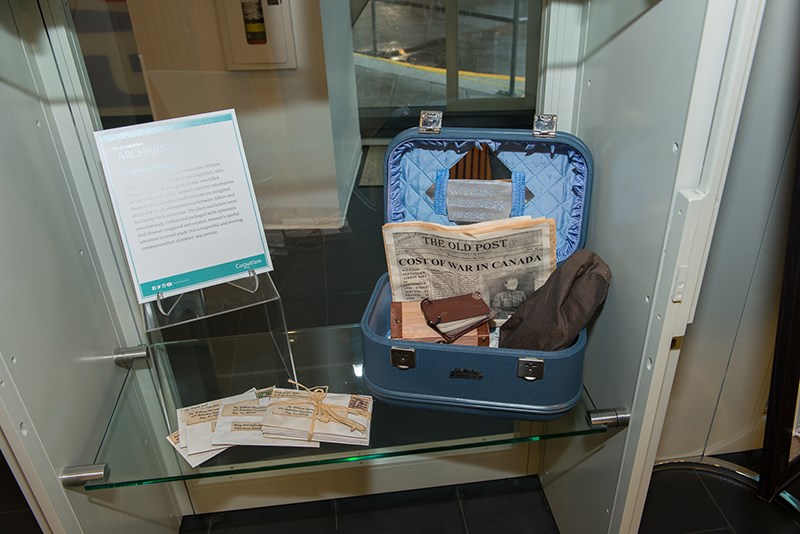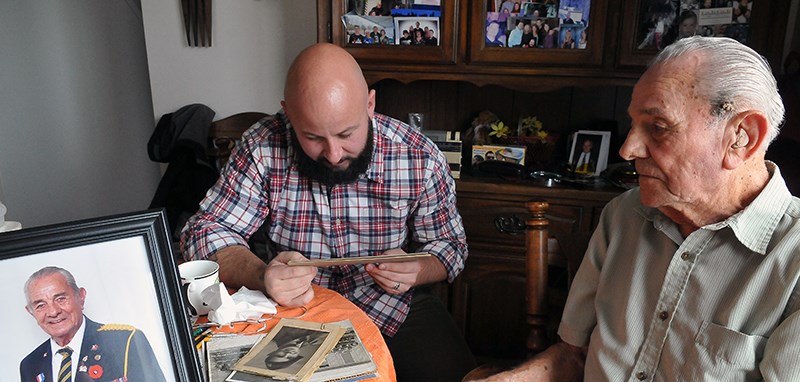At the end of a kitchen table, in a Maillardville home with views of the Fraser River, two Tri-City veterans swap stories and share photos about their service in times of war and peace.
Both were teenagers in the Cowichan Valley on Vancouver Island when they enlisted and were sent to the Bay Street Armoury in Victoria for initial training.
Both ended up with roles supporting the infantry.
That’s where the similarities end.
From the time William “Bill” Leland Berrow’s service finished, after the Second World War, to the year Jeffrey Becker signed up, more than half a century had passed.
Berrow’s military background started when he was 17. Like most young men at the time, he lied about his age, telling recruiters he was 18. He received basic training in Vernon and Red Deer, Alta. before being shipped to England in August 1942. He was stationed there for almost two years as part of the A Platoon with the 69th General Transport Company RCASC when his company got the call to take part in the D-Day landing on June 6, 1944.
Their role was to supply “bullets and beans” to the troops on the front line.
Berrow remembers the scene. Because of the choppy waters on the English Channel that morning, his company of 400 men and 135 trucks loaded with rations was forced to spend the night on the Isle of Wight. On June 7, they made their way to Juno Beach, where thousands of Allied soldiers had already landed.
“The scale of the operation must have been amazing to see,” Becker offered.
Berrow shook his head. “There were 20,000 of us. It’s amazing — and I know it’s a terrible thing to say this — but only 380 were killed on the beach so the percentage was low.”
Berrow recalled it as a “hurry-up-and-wait” scenario. The “Jerries,” he said, were shelling hard and his company couldn’t move until the coast was clear. “It was actually boring at the start because we couldn’t get anywhere.”
After several days, though, their platoon of 60 men got a break and eventually drove down to Caen and Bayeux.
Berrow’s task was as a convoy escort. He rode a Harley Davidson ahead to signal to his platoon to move the trucks closer to the front lines.
He shows a black-and-white image of himself on a motorcycle in France in 1944. Other than a helmet, he has little protection but he didn’t think about getting shot. “It got to a point when we knew who was firing in the area — the Jerries or the Polish, just by the sound of their guns.”
His transport crew followed behind the front lines that made what was known as a the “Maple Leaf Route” to Belgium. They moved millions of tonnes of supplies around western Europe, sometimes travelling as much as 700 miles a day.
In total, Berrow spent a year on the road to shuttle rations to the Canadian soldiers.
Still, by the end of the war, in September 1945, he didn’t have enough points (determined on service length) to get back to England with the first round of troops so he stayed in Holland.
Three months later, however, he was on RMS Queen Elizabeth bound for New York. It carried 14,000 soldiers and their families from Southampton — so many that the 92-year-old recalls waiting more than eight hours to disembark.
By 1946, he was in Port Moody, where he met the love of his life. They were married for 59 years and had two children while Berrow worked at the Flavelle cedar mill.
Decades later, Becker served as a reservist with the 6th Field Engineer Squadron in North Vancouver — the same lineage as the Royal Engineers that built Port Moody — and voluntarily completed three tours of duty.
In October 2002, Becker was deployed to Bihac, Bosnia, on a humanitarian mission. There, he was a jack-of-all-trades and helped with ordnance removal, camp construction and bridge building, among other things.
His eight-person platoon often prodded the ground in search of live land mines, many of which were leftovers from the Soviet era. Their role was to remove and dispose of the explosives, sometimes detonating them far away from camp.
After his Bosnia tour wrapped up in April 2003, Becker returned to Canada as a trades instructor at CFB Gagetown, N.B., for four months and, the following year, served as a military recruiter in Vancouver. But by December 2005, Becker was back on a plane — this time to Kandahar City, Afghanistan. He remembers flying into the war-torn country that “looked like the moon. It was definitely nothing like Bosnia.”
The insurgency had returned to the nation and Becker’s job was to protect the forces and to work with the Afghans “who care deeply for their country. It was a real privilege to be with them.”
During a three-week break in 2006, Becker met up with his girlfriend in Australia and, near the Sydney Opera House, asked for her hand in marriage (the couple now have an eight-year-old daughter). Becker returned to Afghanistan until April 2006, where he served as engineer support and established relations with the Afghans.
Five years later, Becker was back in Afghanistan for his third tour; however, this time he was deployed to Kabul for a 10-month stint. By then, the attacks were increasing and one killed his comrade. It was a fluid tour, Becker recalled, that saw him working with the Afghan National Army, performing more engineering duties and providing mentorship.
Afterwards, Master Cpl. Becker was released from the military and is now listed as medically retired.
Today, the Port Moody resident is in his last year as a business degree student at BCIT. His career path is unclear but he does have a financial stake in a craft distillery on Vancouver Island called Wayward Distillation House.
Today, on Remembrance Day, both Berrow and Becker were set to be at the Port Moody Legion service to pay tribute to the men and women who made the ultimate sacrifice and those who still serve.
This will also be the first year Berrow won’t be taking part in the branch’s colour party. “I’m getting too old for it,” he said with a wave of his hand, “so I’ll just be on the sidelines to give thanks.”
@jcleughTC
••••••••

Coquitlam Public Library will host an exhibit throughout November to mark the centennial of the First World War. The City Centre branch (1169 Pinetree Way) will show memorabilia and artwork that commemorates the heroic actions of:
• William Alexander Atkins, a 19-year-old Coquitlam rancher who was killed on Sept. 27, 1916;
• Edwin Arthur Rand, a New Westminster student killed in the Battle of Vimy Ridge in 1917;
• Filip Konowal, a Ukrainian immigrant who was awarded a Victoria Cross at the Battle for Hill 70 and survived the war but moved to Canada afterwards;
• and Waryam Singh, a Punjabi immigrant who fought for Canada despite not having full citizenship rights.
The display is a partnership between Emily Lonie, Coquitlam's archivist, and Ashleigh Androsoff's students at Douglas College. The project ties into the Lest We Forget program of Library and Archives Canada.
To learn more about the city archives, visit coquitlam.ca/archives.
••••••••••••
HOCKEY NIGHT FOR VETS
The Coquitlam Express will honour veterans at their game versus the Prince George Spruce Kings tonight (Friday).
Players from both teams and fans will take part in a moment of silence before the BC Hockey League game, which starts at 7 p.m. at the Poirier Sport and Leisure Complex.



